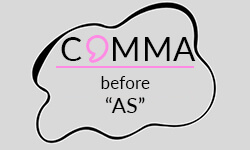
Students can often make errors in academic writing due to confusion surrounding the placement of commas. This is a frequent occurrence because many don’t know the specific rules and exceptions governing their usage. To provide clarity on the use of commas before the adverb “as,” this article explains the rules of whether to place a comma or not through examples and outlines the exceptions to those rules.
When to place a comma before “as”
In general, a comma before “as” is placed if the word introduces an adverbial clause or is used to connect two independent clauses. However, a comma before “as” is not placed when it’s used for comparisons or to show a direct correlation or causation. You also don’t put a comma before the adverb when “as” is used to indicate a specific time or duration.
Comma
Conjunction of clauses
Introductory phrases
No comma
Time expression
Direct correlation
Comparison
Comma rules may vary depending on style guides, and complex sentences may have exceptions for placement. Consider readability without commas.
Comma before “as”
When “as” connects two independent clauses or introduces an adverbial phrase at the beginning of a sentence, you put a comma before “as”.
Conjunction of clauses
A comma is used before “as” when it connects two independent clauses to indicate a pause and clarify the relationship between the clauses. In this scenario, “as” functions as a coordinating conjunction. Here are three short example sentences to illustrate this:
Introductory phrases
A comma is placed before “as” when it introduces an adverbial phrase or clause to imply a pause and highlight the relationship between the clauses. This usage helps ensure conveying the correct message by introducing additional information in the sentence.
No comma before “as”
In general, you don’t put a comma before “as” when it’s used to indicate a comparison, refer to a time, or show a correlation or causation.
Time expressions
A comma before “as” is omitted when “as” is used as a time expression because rather than introducing an independent clause. Instead, it indicates a specific point or duration in time.
Direct correlation
Do not place a comma before “as” when it is used to express a direct correlation or causation because it functions as a conjunction, connecting two ideas closely related in meaning.
Comparisons
You do not typically put a comma before “as” when it is used to make a comparison because it functions as a conjunction, connecting the elements being compared.
Test yourself!
Practice sheet
Insert the commas before “as” when relevant in the ten sentences below. Check your answers in the second tab to see the level of your comprehension obtained from this article.
- She arrived early, as she wanted to get a good seat.
- He ran as fast as he could to catch the bus.
- As soon as I finish my homework, I’ll go to the park.
- The company expanded rapidly as its products gained popularity worldwide.
- She is as intelligent as her sister.
- The movie ended as the credits rolled.
- He arrived as the party was starting.
- She called as soon as she heard the news.
- She played the piano beautifully as she had practiced diligently for years.
- He decided to visit the museum first as he had a keen interest in art.
- She arrived early, as she wanted to get a good seat. (Comma)
- He ran as fast as he could to catch the bus. (No comma)
- As soon as I finish my homework, I’ll go to the park. (No comma)
- The company expanded rapidly, as its products gained popularity worldwide. (Comma)
- She is as intelligent as her sister. (No comma)
- The movie ended as the credits rolled. (No comma)
- He arrived as the party was starting. (No comma)
- She called as soon as she heard the news. (No comma)
- She played the piano beautifully, as she had practiced diligently for years. (Comma)
- He decided to visit the museum first, as he had a keen interest in art. (Comma)
Printing Your Thesis With BachelorPrint
- High-quality bindings with customizable embossing
- 3D live preview to check your work before ordering
- Free express delivery
Configure your binding now!
FAQs
A comma typically goes before “as” when it is used to introduce an adverbial phrase or connect independent clauses. A comma after “as” is not a common usage in English grammar.
In essence, a comma is put before “as” when it is used as a conjunction to introduce an adverbial phrase or connect two independent clauses. This comma helps clarify and determine the relationship between the clauses or phrases in the sentence.
Yes, there can be a comma before “as” in specific situations, such as when “as” is used to introduce an adverbial clause or when it connects two independent clauses. The comma helps clarify the relationship between the clauses or phrases in the sentence.
The use of a comma before “such as” depends on whether it is introducing non-restrictive (optional and for additional information) or restrictive (essential to the meaning) examples within a sentence. Read more in our article comma before “such as”.
